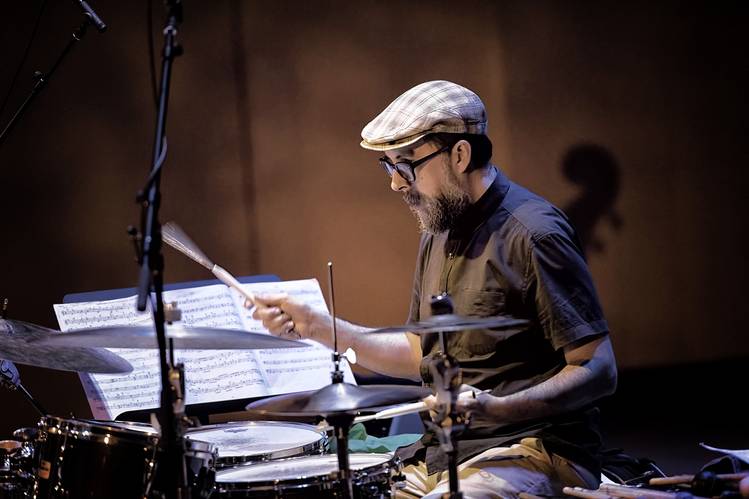It’s traditional, when paying compliment to drummers, to draw comparisons with the octopus, implying agility beyond the means of a paltry pair of human hands. But when considering John Hollenbeck, the multi-limbed creature that seems most appropriate to invoke is the mythical hydra; for while Hollenbeck is certainly no stranger to rhythmic intricacy, it’s ideas that seem to spring forth like so many heads, two more arising as one falls away. Hollenbeck is a composer of music uncategorizable beyond the fact of being always identifiably his. A conceptualist able to translate the traditions of jazz and new music into a fresh, eclectic, forward-looking language of his own invention, intellectually rewarding yet ever accessibly vibrant. A drummer and percussionist possessed of a playful versatility and a virtuosic wit. Most of all, a musical thinker – whether putting pen to paper or conjuring spontaneous sound – allergic to repetition, forever seeking to surprise himself and his audiences. The prolific and unpredictable nature of Hollenbeck’s output has been evident since he first emerged as a leader in late 2001, releasing four completely different albums within a matter of months. Three of them (Quartet Lucy, the duo CD Static Still, and no images, featuring several different configurations) introduced the partnership of Hollenbeck and iconoclastic vocalist Theo Bleckmann, who continue to collaborate in a variety of offbeat settings. Along with keyboardist Gary Versace, they form the Refuge Trio, as boundary-free a small group as one is likely to find. The last of that initial burst of creativity was the self-titled debut of the Claudia Quintet, Hollenbeck’s longest-running ensemble. Over the course of its six CDs, Claudia has cemented its reputation as one of the most innovative and adaptable units in modern jazz, so deftly attuned to one another that Hollenbeck’s most dizzying compositional leaps are taken with an air of playfulness and skewed humor. The group was named “Rising Star Jazz Group” in DownBeat Magazine’s 2008 Critics’ Poll, received a grant from the Chamber Music America New Jazz Works: Commissioning and Ensemble Development program to compose a suite which can be heard on 2009’s Royal Toast, and received a grant from Arts International to travel to Brazil for performances in the spring of 2002. The quintet was also commissioned by the University of Rochester to set the work of Kenneth Patchen as part of their 100th birthday celebration of the ground-breaking poet. Those pieces can be heard on Claudia’s latest release, What Is the Beautiful?, featuring vocals by Bleckmann and Kurt Elling. Hollenbeck has also rethought the big band via his Large Ensemble, which topped the “Rising Star Big Band” category in DownBeat’s 2011 Critics’ Poll. The JHLE trades the gale force blowing of most such bands for a multi-hued palette of tonal colors and rich, evocative atmospheres. Both of the ensemble’s releases have been nominated for Grammys, A Blessing in 2006 and eternal interlude in 2009. His large-band pieces have also been recorded by Austria’s Jazz Bigband Graz on 2006’s critically-acclaimed Joys and Desires. In 2010, the CMA/FACE French-American Jazz Exchange Program awarded Hollenbeck a grant to develop work with Daniel Yvinec and the Orchestre National de Jazz of France, resulting in the release of Shut up and Dance (Bee Jazz), named as one of the top five albums of the year by Le Monde. If these projects can safely be termed “jazz” (at least by those comfortable with the label’s more progressive interpretations), they should by no means be taken as indicating that Hollenbeck’s output is limited to even that genre’s most elastic borders. His growing body of commissioned compositions relate just as obliquely to the “new music” tag, exemplifying his ability to not so much defy categorization as to evolve beyond its necessity. One of Hollenbeck’s earliest appearances on record was as the composer of “The Shape of Spirit,” a piece for wind ensemble issued on the Mons label in 1998. The following year he composed “Processional and Desiderata” for wind ensemble and orator (released by Challenge Records in 2001), written for and featuring the voice and trombone of Bob Brookmeyer, with whom Hollenbeck studied composition under a National Endowment grant in 1994. His piece “The Cloud of Unknowing,” commissioned by the Bamberg Choir in Germany, fit comfortably alongside works by J.S. Bach, Igor Stravinsky & Paul Hindemith when it was released in 2001 on the Edel Classics label, while his 2004 chamber piece “Demütig Bitten,” commissioned by Germany’s Windsbacher Knabenchor, was released on the Rondeau label along with works by Giovanni Gabrieli, Josquin des Prez and J.S. Bach (again). In 2002, his IAJE Gil Evans Fellowship Commission piece, “A Blessing,” featuring Theo Bleckmann’s stunning vocals, was performed to critical acclaim at the IAJE Conference; and in 2003 his IAJE/ASCAP Commission, “Folkmoot,” was premiered in Toronto, Canada. A self-released collection of commissioned works, Rainbow Jimmies, showcased several of his chamber pieces. Hollenbeck’s most recent works include commissions by the Bang on a Can and the People’s Commissioning Fund; the Ethos Percussion Group funded by the Jerome Foundation; Youngstown State University; Gotham Wind Symphony; the Painted Bride Art Center of Philadelphia; the Frankfurt Radio Big Band; and the University of the Arts, Philadelphia. Hollenbeck received degrees in percussion and jazz composition from the Eastman School of Music before moving to New York City in the early 1990s. He quickly struck up relationships with some of the leading lights of jazz (Fred Hersch, Tony Malaby, Kenny Wheeler) and new music (composer/choreographer Meredith Monk, for whose works “Magic Frequencies,” “Mercy,” and “The Impermanence Project” he composed and performed percussion scores). His awards and honors include winning the Jazz Composers Alliance Composition Contest in 1995 and 2002; Meet the Composer’s Grants in 1995 and 2001; top spots in the Rising Star Composer and Arranger categories in the 2008 & 2009 DownBeat Critics’ Poll; the 2010 ASCAP Jazz Vanguard Award; and a 2007 Guggenheim Fellowship. Since 2005, he has been a professor of Jazz Drums and Improvisation at the Jazz Institute Berlin. from http://johnhollenbeck.com
